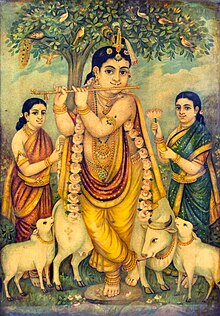|
Dvadasha Stotra
The Dvadasha Stotra (Sanskrit: द्वादशस्तोत्रम्, romanized: Dvādaśastotraṃ) is a series of 12 stotras, or religious hymns, composed by Madhvacharya, the 13th-century founder of the Dvaita school of Indian philosophy. Dvadaśa in Sanskrit means "twelve", and all the 12 stotras are in praise of the Hindu god Vishnu.[1][2] The third stotra is considered a summary of Madhvacharya's philosophy.[3] It is believed that the stotras were composed in connection with the installation of the idol of the Hindu god Krishna at Udupi.[4] There have been numerous musical compositions of the Dvadasha Stotra over the years. It is also a ritual to recite the Dvadasha Stotra at the time of naivedya[5] or the offering of food to God performed at Madhva temples. HymnThe first verse of the stotra is as follows:[6]
Commentaries and translationsThere are eight known commentaries on the Dvadasha Stotra,[7] authored by:
See alsoReferences
External links |
||||||||||||||||
Portal di Ensiklopedia Dunia
